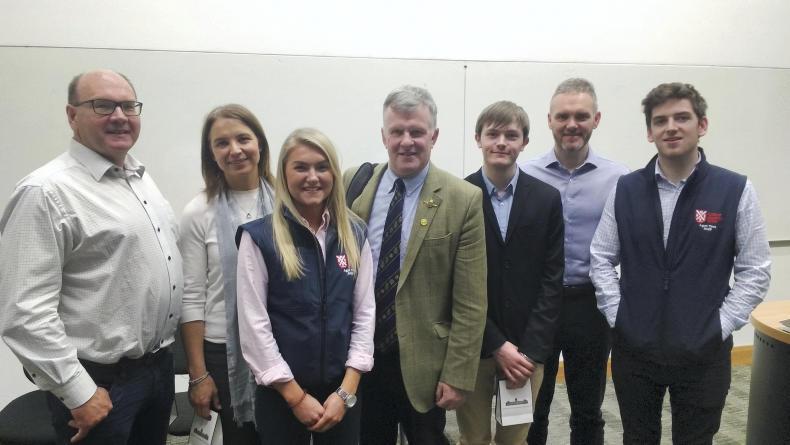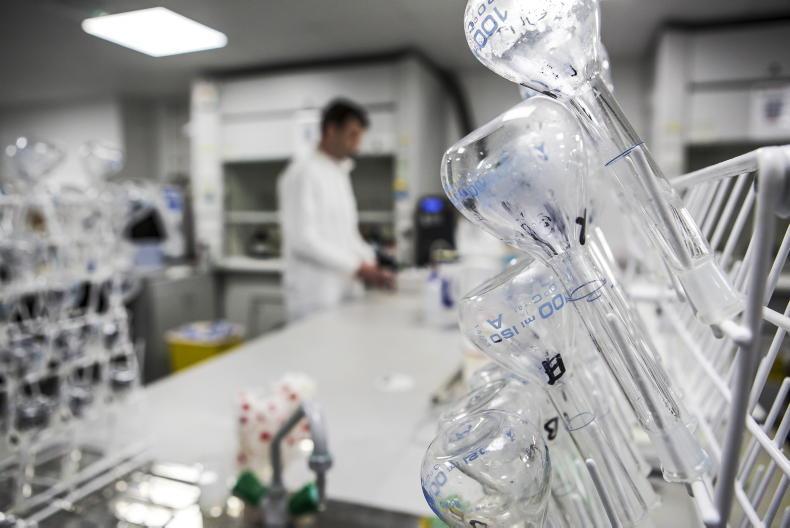Despite attempts by vegans to discredit and disrupt the meat industry, a rising global population and increasingly affluent consumers in developing countries will see meat demand increasing 75% by 2050.
According to Professor Nigel Scollan from Queen’s University Belfast (QUB), substantial increases in consumption are likely across all meat categories, but particularly for pigs and poultry.
“It is a major opportunity for our local food industry,” he told attendees at a symposium organised by QUB Agricultural Technology students in Belfast last week.
However, he warned that the expected population growth will also bring many challenges. In particular, climate change could reduce production in parts of the world where the population is rapidly growing and where land is already delicate and fragile, so yields can be very variable.
Climate change
Closer to home, while climate change is less of a concern, farming must avoid adverse publicity by addressing a number of key issues, said Scollan.
In particular, more must be done to lower the environmental footprint of food production, particularly in the beef sector.
He also emphasised the importance of animal welfare and the need for industry to engage in the debate around nutrition and health.
This latter point was further developed by Dr Ruth Price from Ulster University, who highlighted the importance of animal-based products in human health.
“For example, animal protein is easily absorbed, which is especially important in younger and older people.
“We also must look at foods as a whole. Dairy might be high in saturated fat, but there is a plethora of health benefits from consuming dairy. Our focus should be on portion size – not removing animal-based products from our diet,” she said.
Vegan case
Making the case for a vegan lifestyle at the event was Matthew McKeefry, an activist with Direct Action Everywhere. He believes that change is happening rapidly, and that by 2050 animal slaughter will be a thing of the past.
In 2016, 1% of the UK population was vegan, but by 2018 this figure had increased to 7% (other surveys suggest it is 3%), said McKeefry.
However, his main argument centred around speciesism, which gives humans greater rights than non-human animals. McKeefry likened this to other forms of bigotry, such racism or sexism.
“Speciesism leads to abuse of non-human animals. The next logical step is to stop paying for animals to be killed,” said McKeefry.
His views were challenged by Sam Chesney, the chair of the Ulster Farmers’ Union (UFU) beef and sheep committee, who described veganism as a “misinformed hysterical cult”.
He was critical of what he saw as “lunatic behaviour” by some vegan activists, and said that they peddled fake news on social media.
He pointed out that many plant-based alternatives are imported, and therefore carry high food miles and a high carbon footprint. He also highlighted that many animals (insects, etc) are killed in the growing of plant-based foods.
Read more
Police called after 100 vegan activists invade Australian farm
One in four people believe meat names should be for meat products only
Despite attempts by vegans to discredit and disrupt the meat industry, a rising global population and increasingly affluent consumers in developing countries will see meat demand increasing 75% by 2050.
According to Professor Nigel Scollan from Queen’s University Belfast (QUB), substantial increases in consumption are likely across all meat categories, but particularly for pigs and poultry.
“It is a major opportunity for our local food industry,” he told attendees at a symposium organised by QUB Agricultural Technology students in Belfast last week.
However, he warned that the expected population growth will also bring many challenges. In particular, climate change could reduce production in parts of the world where the population is rapidly growing and where land is already delicate and fragile, so yields can be very variable.
Climate change
Closer to home, while climate change is less of a concern, farming must avoid adverse publicity by addressing a number of key issues, said Scollan.
In particular, more must be done to lower the environmental footprint of food production, particularly in the beef sector.
He also emphasised the importance of animal welfare and the need for industry to engage in the debate around nutrition and health.
This latter point was further developed by Dr Ruth Price from Ulster University, who highlighted the importance of animal-based products in human health.
“For example, animal protein is easily absorbed, which is especially important in younger and older people.
“We also must look at foods as a whole. Dairy might be high in saturated fat, but there is a plethora of health benefits from consuming dairy. Our focus should be on portion size – not removing animal-based products from our diet,” she said.
Vegan case
Making the case for a vegan lifestyle at the event was Matthew McKeefry, an activist with Direct Action Everywhere. He believes that change is happening rapidly, and that by 2050 animal slaughter will be a thing of the past.
In 2016, 1% of the UK population was vegan, but by 2018 this figure had increased to 7% (other surveys suggest it is 3%), said McKeefry.
However, his main argument centred around speciesism, which gives humans greater rights than non-human animals. McKeefry likened this to other forms of bigotry, such racism or sexism.
“Speciesism leads to abuse of non-human animals. The next logical step is to stop paying for animals to be killed,” said McKeefry.
His views were challenged by Sam Chesney, the chair of the Ulster Farmers’ Union (UFU) beef and sheep committee, who described veganism as a “misinformed hysterical cult”.
He was critical of what he saw as “lunatic behaviour” by some vegan activists, and said that they peddled fake news on social media.
He pointed out that many plant-based alternatives are imported, and therefore carry high food miles and a high carbon footprint. He also highlighted that many animals (insects, etc) are killed in the growing of plant-based foods.
Read more
Police called after 100 vegan activists invade Australian farm
One in four people believe meat names should be for meat products only









SHARING OPTIONS